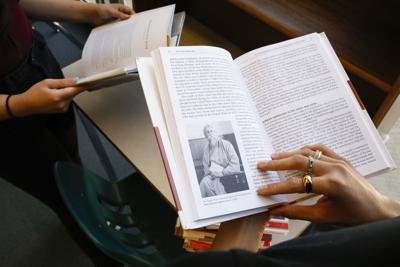Dozens of advocates for a requirement to teach Hmong and Asian American history in Wisconsin schools packed a State Capitol meeting room Thursday.
They had waited years for their chance to speak on a proposal in front of the Assembly Committee on Education in a public hearing, and finally got their chance with a new committee chair this session.
Students, educators and community members from around Wisconsin offered support for Assembly Bill 232 to the committee. The immediate next step would require the committee to vote on the proposal and forward it to the entire Assembly.
"We don't have a meeting scheduled at this point, we'll be in touch," committee chair Rep. Joel Kitchens, R-Sturgeon Bay, told supporters at the end of the hearing.
The proposal would amend Act 31 to add “Hmong Americans and Asian Americans” to an already-existing list of groups that schools are required to teach about to grow “an understanding of human relations:” American Indians, Black Americans and Hispanics.
Bill coauthor Rep. Patrick Snyder, R-Schofield, called the legislation “a simple but important change to state statute.” Similar proposals in past years did not receive a hearing with the committee, so Thursday was already a promising step for bill supporters following bipartisan support in the legislation’s introduction in April.
“I’m really hopeful that this is the year we get it across the finish line,” said coauthor Rep. Katrina Shankland, D-Stevens Point.
According to research from Tony DelaRosa, a doctoral student at the University of Wisconsin-Madison, eight states have adopted Asian American or ethnic studies requirements for pre-kindergarten through grade 12 schools. Another 14, including Wisconsin, have AAPI coalitions advocating for passage of a policy.
Snyder noted in his testimony that Wisconsin is home to the third-largest population of Hmong Americans of any state and that the Asian American population here has grown 82% since the 2000 Census.
Multiple speakers pointed to the rise in anti-Asian hate incidents during the COVID-19 pandemic as evidence that cultural history education is necessary. FBI hate crime statistics show a more than 70% increase in documented anti-Asian hate crimes, according to a U.S. Department of Justice report.
“There is no other way to combat fear other than education,” said Caitlin Lee, who leads the Eau Claire School District’s Hmong Parent Teacher Association.
Verona Area High School student Aimika Ketilson, the co-president of the school’s Asian Student Association, asked legislators to avoid “repeating these mistakes of the past” by continuing to ignore a culture that has greatly contributed to American history.
“I grew up with the idea that Asians were always the foreigner, and never truly American,” Ketilson said. “Because of that I believed that I would always be ‘that Asian kid,’ never truly American.”
Multiple speakers who are not Asian American also spoke of the importance of learning about other cultures, encouraging legislators to pass the bill.
William Dick Jr., a graduate of Wisconsin public schools, and two of his children spoke during the hearing. He recalled the first time he learned that “Hmong” was a culture group was when he reached UW-Madison’s campus, and said there are both business and societal benefits to learning about other cultures.
Verona teacher Kabby Hong, the 2022 Wisconsin Teacher of the Year, listed numerous historic advancements in the United States led by Asian Americans and said “Asian American history is American history.”
“You can’t tell the story of this great nation without the contributions of the AAPI community,” he said.






